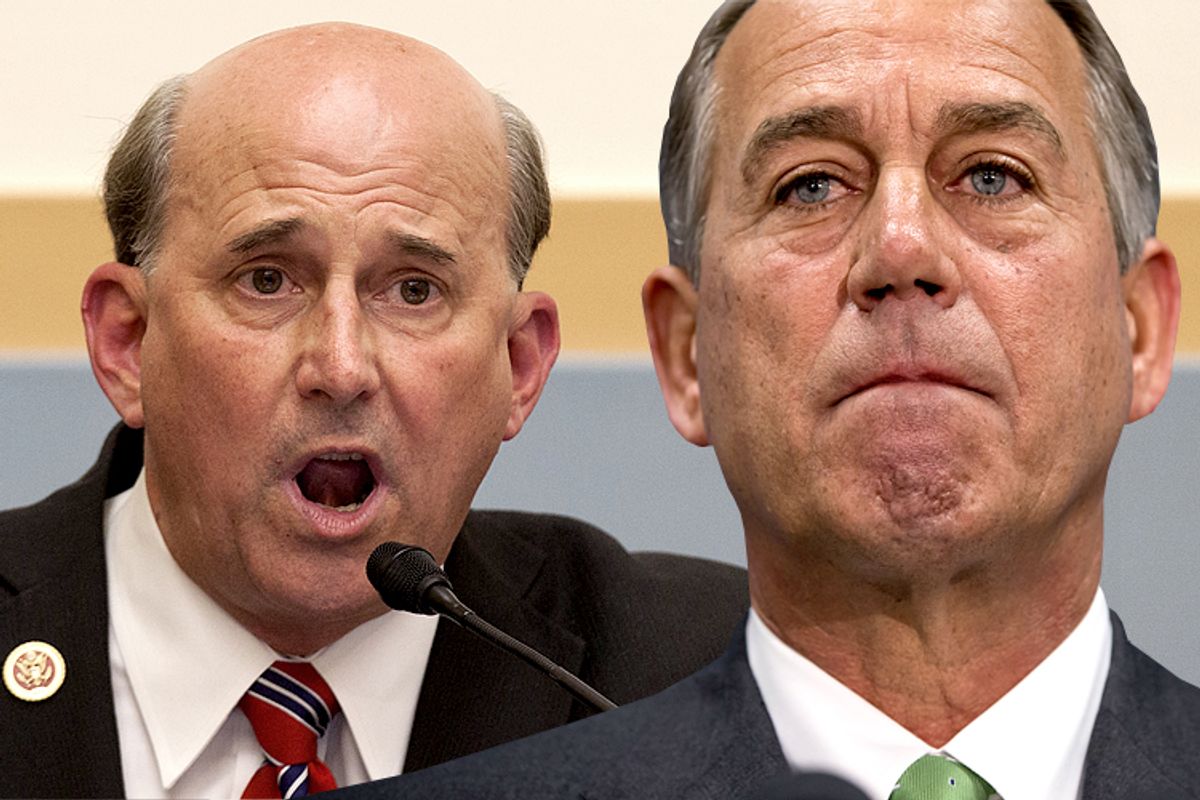Last week, after one of majority whip Steve Scalise’s trademark face plants, the Republican leadership in the House was left with yet another intra-party fight to try and resolve. As the House GOP’s budget proposal moved towards a vote to get it out of committee, the leadership insisted that an amendment be added to raise defense spending using a loophole that obviates caps put in place by sequestration. Budget Committee chair Tom Price objected, saying that the additional spending, which was not paid for, would anger fiscal “hawks” on the committee. But defense “hawks” were adamant that more military spending be included, and so the leadership ignored Price and pushed forward with assurances from Scalise that the votes were there for it to pass. Scalise was wrong, and the process stalled. The budget finally cleared the committee, but without the additional military spending.
So, faced with a full floor vote on a budget that faced potential opposition from two powerful camps that each refused to budge on their mutually exclusive demands, the leadership had to figure something out. And they came up with a novel solution: two budgets!
Or, rather, they’re exploiting a rarely used procedural move to pit two slightly different budgets against one another in a to-the-death fight for supremacy. Here’s Politico with the details:
The move is called called “Queen of the Hill,” and it’s hardly ever used on Capitol Hill. Speaker John Boehner (R-Ohio), House Majority Leader Kevin McCarthy (R-Calif.) and Majority Whip Steve Scalise (R-La.) will allow one vote on Rep. Tom Price’s (R-Ga.) Budget Committee’s spending plan, which infuriated defense-minded lawmakers who thought it underfunded the Pentagon.
They’ll also allow a vote on a nearly identical budget, which includes language to increase defense spending. Whichever plan gets the most votes will become the House GOP’s budget.
It’s basically Thunderdome for the budgeting process, with John Boehner as a sort of parliamentary Tina Turner.
The leadership is exposing itself to some risk by going down this path. Boehner and crew have a preferred outcome – a budget that includes additional military spending that isn’t paid for – but they’ve opened up the possibility that their preferred budget may not be approved. They’ve already had one embarrassing false start in this process, and their recent history is studded with examples of bills they thought would pass going down to surprising defeats at the hands of their own caucus. The fact that the leadership is gambling on this obscure procedural maneuver suggests they’ve joined the rest of the political world in recognizing the futility of trying to compromise with House Republicans.
The one thing that might see them through to victory is, ironically enough, Obamacare. For all the drama over the GOP budget’s military spending spree and draconian cuts to social programs, the fact is that this whole process is entirely about the Affordable Care Act. The end goal of all this is to use reconciliation to pass a budget that repeals Obamacare, which will then be swiftly cut down by President Obama’s veto pen. This budget is designed to fail, and its failure will allow Republicans to spend the months leading up to the 2016 election making the case that Obamacare repeal is within reach, so long as voters send a Republican to the White House and maintain the party’s Senate majority.
And as National Journal reported yesterday, conservatives who might otherwise be wary of the additional military spending are inclined to swallow hard and vote in favor of the leadership’s budget, simply because they hate the Affordable Care Act:
While Rep. Matt Salmon of Arizona said he prefers [the budget plan without additional military spending], he'll vote for the budget with plussed-up money for defense in the event the first one fails. Because, he said, there are other more important things to consider.
"The thing that appeals to me more than anything is how important it is to get to reconciliation," Salmon, a Freedom Caucus member, said. "I campaigned when I came back here with my heart and soul to get rid of Obamacare, and it's the one shot that we've got to get something on his desk."
And Salmon believes his many of his colleagues can get on board with the revised budget.
Passing a budget through the House is no guarantee that it will reach Obama’s desk – they still would have to come to an agreement with the Senate, and if the additional military spending is approved, that could be a big problem. If nothing else, though, the Republican leadership has finally found a way to channel its caucus’ all-consuming hatred of Obamacare in a way that doesn’t result in a self-made political disaster. Of course, that assumes that this "queen of the hill" play works. And given the House leadership's track record, that's not an entirely safe assumption.



Shares